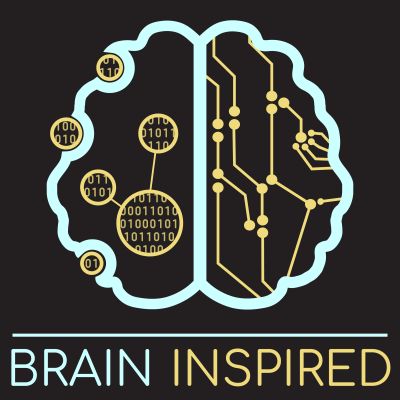Neuroscience and artificial intelligence work better together. Brain inspired is a celebration and exploration of the ideas driving our progress to understand intelligence. I interview experts about their work at the interface of neuroscience, artificial intelligence, cognitive science, philosophy, psychology, and more: the symbiosis of these overlapping fields, how they inform each other, where they differ, what the past brought us, and what the future brings. Topics include computational neuroscience, supervised machine learning, unsupervised learning, reinforcement learning, deep learning, convolutional and recurrent neural networks, decision-making science, AI agents, backpropagation, credit assignment, neuroengineering, neuromorphics, emergence, philosophy of mind, consciousness, general AI, spiking neural networks, data science, and a lot more. The podcast is not produced for a general audience. Instead, it aims to educate, challenge, inspire, and hopefully entertain those interested in learning more about neuroscience and AI.
https://braininspired.co/series/brain-inspired/
BI 094 Alison Gopnik: Child-Inspired AI
Alison and I discuss her work to accelerate learning and thus improve AI by studying how children learn, as Alan Turing suggested in his famous 1950 paper. The ways children learn are via imitation, by learning abstract causal models, and active learning by implementing a high exploration/exploitation ratio. We also discuss child consciousness, psychedelics, the concept of life history, the role of grandparents and elders, and lots more.
- Alison's Website.
- Cognitive Development and Learning Lab.
- Twitter: @AlisonGopnik.
- Related papers:
- Childhood as a solution to explore-exploit tensions.
- The Aeon article about grandparents, children, and evolution: Vulnerable Yet Vital.
- Books:
- The Gardener and the Carpenter: What the New Science of Child Development Tells Us About the Relationship Between Parents and Children.
- The Scientist in the Crib: What Early Learning Tells Us About the Mind.
- The Philosophical Baby: What Children's Minds Tell Us About Truth, Love, and the Meaning of Life.
Take-home points:
- Children learn by imitation, and not just unthinking imitation. They pay attention to and evaluate the intentions of others and judge whether a person seems to be a reliable source of information. That is, they learn by sophisticated socially-constrained imitation.
- Children build abstract causal models of the world. This allows them to simulate potential outcomes and test their actions against those simulations, accelerating learning.
- Children keep their foot on the exploration pedal, actively learning by exploring a wide spectrum of actions to determine what works. As we age, our exploratory cognition decreases, and we begin to exploit more what we've learned.
Timestamps 0:00 - Intro 4:40 - State of the field 13:30 - Importance of learning 20:12 - Turing's suggestion 22:49 - Patience for one's own ideas 28:53 - Learning via imitation 31:57 - Learning abstract causal models 41:42 - Life history 43:22 - Learning via exploration 56:19 - Explore-exploit dichotomy 58:32 - Synaptic pruning 1:00:19 - Breakthrough research in careers 1:04:31 - Role of elders 1:09:08 - Child consciousness 1:11:41 - Psychedelics as child-like brain 1:16:00 - Build consciousness into AI?
